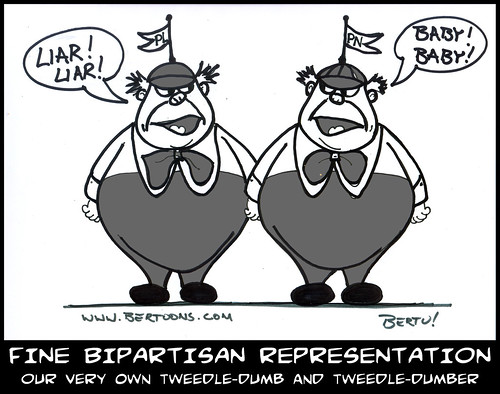Some months ago, while being interviewed on public television (Dissett), I had described the issue of political party financing as extremely urgent and a priority. I strongly argued that the issue should be tackled immediately, considering its direct bearing on our country’s democracy. The interviewer had dismissed my claims to urgency, apparently comforted by the fact that the issue was, at the time, being tackled by a parliamentary committee.
Recent events have, since, brought work in that committee to a standstill. Moreover, about 15 years ago and we were, compared to most countries, already late, a report (the Galdes Report, 1995) had been tabled in the House of Representatives but still, to date, nothing has come out of it. Since then, no significant developments have taken place and no concrete measures have been implemented with regard to the issue under discussion.
The issue of party finance is crucial and central to any democracy in this day and age.
As the Council of Europe’s Third European Conference of Specialised Services in the Fight against Corruption, held between September 28-30, 1998, had declared: “…political parties play an essential role in democratic systems.
“Their operation requires appropriate resources while electoral campaigns have become expensive. Faced with increasing expenses, political parties are unable to live only on their members’ fees and have to solicit and accept donations. Trading in influence has, thus, developed. In order to remedy this situation, which is detrimental to the rule of law and democracy, it is necessary to ensure political parties are financed in a wholly transparent manner.”
Political parties are challenged today with complex tasks, including researching and developing relevant and updated policies as well as communicating their message in the best possible manner in order to garner maximum support and win elections. Such tasks necessitate a sound structural organisation and infrastructure, which cannot be put in place and function without adequate financial resources.
The process of securing the necessary funds could lead to abuse. Parties could potentially end up at the mercy of particular donors who may seek to exert control through undue or unlawful influence. Legislation all over the world has been enacted precisely with the aim of averting such jeopardy and limit the dangers to democracy.
Since political parties are not just voluntary organisations accountable solely to their members, but organs of a constitutional nature and relevance, the necessary legislation tackling the most urgent issue of disclosure and public auditing of parties’ finances should be enacted. Strengthening democracy means ensuring political parties are financed in an accountable and transparent manner.
Thus, the Galdes Report, tackles such issues as whether there should be a ceiling on private donations, whether donations exceeding a certain amount should be prohibited and sums exceeding which amount should import a duty of disclosure.
In the United States, disclosure of small amounts by small donors was held by the Supreme Court to potentially seriously infringe on the rights to privacy and association and belief and, thus, one must always strive to strike a balance.
Tackling the issue of eligibility for state financing, linked primarily to the number of votes obtained by a party in the previous general election, the Galdes Report again establishes the requirement of the compulsory publication of financial statements and accounts, as well as disclosure of particular donations, exceeding certain amounts. It proposes strict penalties in cases of default or non-observance, enforced by a regulatory and supervising authority to be established under the same proposed legislation.
The report had, for instance, also tackled the issue of candidates’ expenses during election campaigns, which amount, just under €1,400, 15 years and four elections ago was deemed too low and unrealistic. It was suggested that it should be increased, in addition to proposing a more realistic definition of the relevant period preceding an election. We are still debating this today and nothing concrete has as yet materialised.
This aspect of transparency is important too.
It is time to rethink the structure and internal organisation and set-up of political parties as constitutional vehicles. It is time to think about the relevance of political party stations today. It is a time of great challenges where we must continue to revise and upgrade the constitutional architecture for the future.
As has always happened under successive Nationalist Administrations, we must continue strengthening democracy and this is the next step.
It is time to pass from reports and committees to action and legislation. And we must continue on the good work being done in public broadcasting , upgrading it too.
Dr Debono wrote his doctoral thesis for the law degree on The Constitutional Implications Of Party Organisation And Party Finance (1999).
Website: www.francodebono.info
*****
Zolabytes is a rubrique on J’accuse – the name is a nod to the original J’accuser (Emile Zola) and a building block of the digital age (byte). Zolabytes is intended to be a collection of guest contributions in the spirit of discussion that has been promoted by J’accuse on the online Maltese political scene for 5 years.
Opinions expressed in zolabyte contributions are those of the author in question. Opinions appearing on zolabytes do not necessarily reflect the editorial line of J’accuse the blog. Accompanying images selected by J’accuse.
****
Related articles by Zemanta
- Major political donors get anonymity (theage.com.au)
- Paying for politics and putting power where it should be (theglobeandmail.com)
- Ireland is not a Democracy. Change is therefore impossible. (politics.ie)
- Are capitalism and parliamentary democracy unsuited to Ireland? (politics.ie)






![Reblog this post [with Zemanta]](http://img.zemanta.com/reblog_e.png?x-id=37d347b4-9541-4c91-88e2-94c9724dc9b8)

